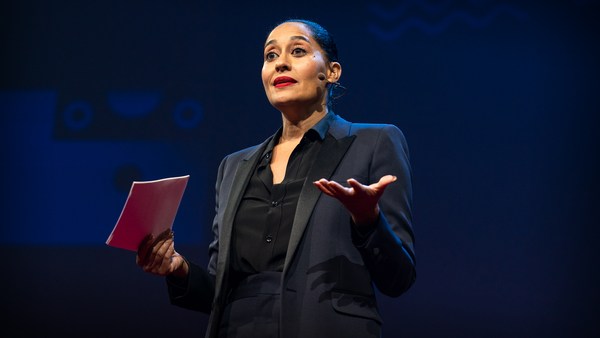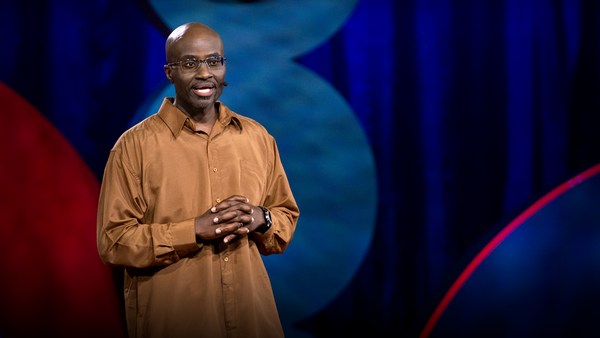So sometimes I get angry, and it took me many years to be able to say just those words. In my work, sometimes my body thrums, I'm so enraged. But no matter how justified my anger has been, throughout my life, I've always been led to understand that my anger is an exaggeration, a misrepresentation, that it will make me rude and unlikable. Mainly as a girl, I learned, as a girl, that anger is an emotion better left entirely unvoiced.
Think about my mother for a minute. When I was 15, I came home from school one day, and she was standing on a long veranda outside of our kitchen, holding a giant stack of plates. Imagine how dumbfounded I was when she started to throw them like Frisbees...
(Laughter)
into the hot, humid air. When every single plate had shattered into thousands of pieces on the hill below, she walked back in and she said to me, cheerfully, "How was your day?"
(Laughter)
Now you can see how a child would look at an incident like this and think that anger is silent, isolating, destructive, even frightening. Especially though when the person who's angry is a girl or a woman. The question is why.
Anger is a human emotion, neither good nor bad. It is actually a signal emotion. It warns us of indignity, threat, insult and harm. And yet, in culture after culture, anger is reserved as the moral property of boys and men. Now, to be sure, there are differences. So in the United States, for example, an angry black man is viewed as a criminal, but an angry white man has civic virtue. Regardless of where we are, however, the emotion is gendered. And so we teach children to disdain anger in girls and women, and we grow up to be adults that penalize it.
So what if we didn't do that? What if we didn't sever anger from femininity? Because severing anger from femininity means we sever girls and women from the emotion that best protects us from injustice. What if instead we thought about developing emotional competence for boys and girls? The fact is we still remarkably socialize children in very binary and oppositional ways. Boys are held to absurd, rigid norms of masculinity -- told to renounce the feminine emotionality of sadness or fear and to embrace aggression and anger as markers of real manhood. On the other hand, girls learn to be deferential, and anger is incompatible with deference. In the same way that we learned to cross our legs and tame our hair, we learned to bite our tongues and swallow our pride. What happens too often is that for all of us, indignity becomes imminent in our notions of femininity.
There's a long personal and political tale to that bifurcation. In anger, we go from being spoiled princesses and hormonal teens, to high maintenance women and shrill, ugly nags. We have flavors, though; pick your flavor. Are you a spicy hot Latina when you're mad? Or a sad Asian girl? An angry black woman? Or a crazy white one? You can pick. But in fact, the effect is that when we say what's important to us, which is what anger is conveying, people are more likely to get angry at us for being angry. Whether we're at home or in school or at work or in a political arena, anger confirms masculinity, and it confounds femininity. So men are rewarded for displaying it, and women are penalized for doing the same.
This puts us at an enormous disadvantage, particularly when we have to defend ourselves and our own interests. If we're faced with a threatening street harasser, predatory employer, a sexist, racist classmate, our brains are screaming, "Are you kidding me?" And our mouths say, "I'm sorry, what?"
(Laughter)
Right? And it's conflicting because the anger gets all tangled up with the anxiety and the fear and the risk and retaliation. If you ask women what they fear the most in response to their anger, they don't say violence. They say mockery. Think about what that means. If you have multiple marginalized identities, it's not just mockery. If you defend yourself, if you put a stake in the ground, there can be dire consequences.
Now we reproduce these patterns not in big, bold and blunt ways, but in the everyday banality of life. When my daughter was in preschool, every single morning she built an elaborate castle -- ribbons and blocks -- and every single morning the same boy knocked it down gleefully. His parents were there, but they never intervened before the fact. They were happy to provide platitudes afterwards: "Boys will be boys." "It's so tempting, he just couldn't help himself." I did what many girls and women learn to do. I preemptively kept the peace, and I taught my daughter to do the same thing. She used her words. She tried to gently body block him. She moved where she was building in the classroom, to no effect. So I and the other adults mutually constructed a particular male entitlement. He could run rampant and control the environment, and she kept her feelings to herself and worked around his needs. We failed both of them by not giving her anger the uptake and resolution that it deserved. Now that's a microcosm of a much bigger problem. Because culturally, worldwide, we preference the performance of masculinity -- and the power and privilege that come with that performance -- over the rights and needs and words of children and women.
So it will come as absolutely no surprise, probably, to the people in this room that women report being angrier in more sustained ways and with more intensity than men do. Some of that comes from the fact that we're socialized to ruminate, to keep it to ourselves and mull it over. But we also have to find socially palatable ways to express the intensity of emotion that we have and the awareness that it brings of our precarity. So we do several things. If men knew how often women were filled with white hot rage when we cried, they would be staggered.
(Laughter)
We use minimizing language. "We're frustrated. No, really, it's OK."
(Laughter)
We self-objectify and lose the ability to even recognize the physiological changes that indicate anger. Mainly, though, we get sick. Anger has now been implicated in a whole array of illnesses that are casually dismissed as "women's illnesses." Higher rates of chronic pain, autoimmune disorders, disordered eating, mental distress, anxiety, self harm, depression. Anger affects our immune systems, our cardiovascular systems. Some studies even indicate that it affects mortality rates, particularly in black women with cancer.
I am sick and tired of the women I know being sick and tired. Our anger brings great discomfort, and the conflict comes because it's our role to bring comfort. There is anger that's acceptable. We can be angry when we stay in our lanes and buttress the status quo. As mothers or teachers, we can be mad, but we can't be angry about the tremendous costs of nurturing. We can be angry at our mothers. Let's say, as teenagers -- patriarchal rules and regulations -- we don't blame systems, we blame them. We can be angry at other women, because who doesn't love a good catfight? And we can be angry at men with lower status in an expressive hierarchy that supports racism or xenophobia. But we have an enormous power in this. Because feelings are the purview of our authority, and people are uncomfortable with our anger. We should be making people comfortable with the discomfort they feel when women say no, unapologetically. We can take emotions and think in terms of competence and not gender. People who are able to process their anger and make meaning from it are more creative, more optimistic, they have more intimacy, they're better problem solvers, they have greater political efficacy.
Now I am a woman writing about women and feelings, so very few men with power are going to take what I'm saying seriously, as a matter of politics. We think of politics and anger in terms of the contempt and disdain and fury that are feeding a rise of macho-fascism in the world. But if it's that poison, it's also the antidote. We have an anger of hope, and we see it every single day in the resistant anger of women and marginalized people. It's related to compassion and empathy and love, and we should recognize that anger as well.
The issue is that societies that don't respect women's anger don't respect women. The real danger of our anger isn't that it will break bonds or plates. It's that it exactly shows how seriously we take ourselves, and we expect other people to take us seriously as well. When that happens, chances are very good that women will be able to smile when they want to.
(Applause)
Thank you.
(Applause) (Cheers)





